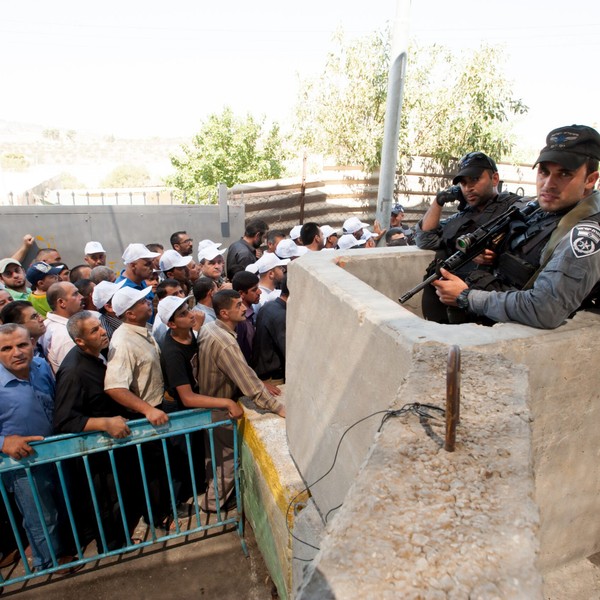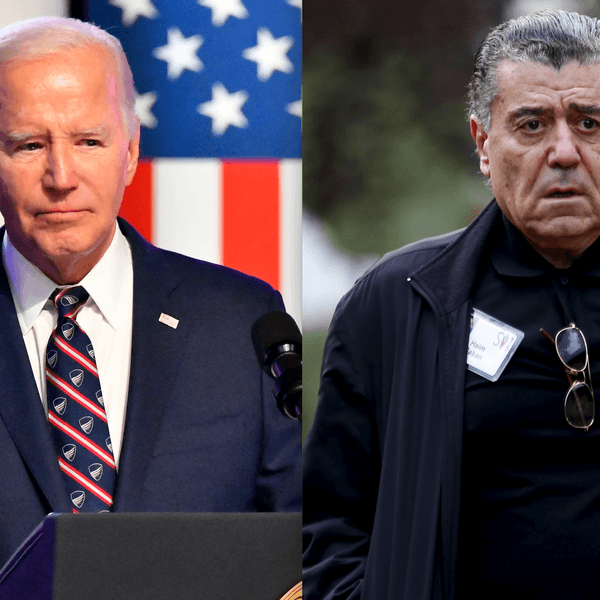Spanish newspaper El Pais had a scoop last week: at the beginning of June, Juan Gonzalez and Jorge Rodriguez — President Joe Biden’s adviser on Latin American affairs and Venezuelan President Nicolas Maduro’s right-hand man respectively — secretly met in Qatar.
The focus of the meeting? Exploring ways to unblock the two countries’ bilateral relations, heavily strained over the Trump administration’s crippling sanctions against Venezuela, which were initiated amid accusations of Maduro’s dictatorial drift. Various U.S. embargoes have been in place against the country since 2005, though Trump imposed tougher economic sanctions beginning in 2017.
The meeting in Qatar was not expected to deliver any major breakthroughs, which neither Washington or Caracas seem prepared for at the moment. Rather, it was about establishing a direct, high-level channel of communication to discuss future relations.
Reportedly, a release of prisoners, including Alex Saab, the Colombian businessman detained since 2021 in the U.S. on money-laundering charges, was discussed. They also talked about, according to the paper, the need to “normalize political life” in Venezuela.
Both sides remain very distant on these and other issues, but the fact that talks are happening is in itself a sign that Washington and Caracas are not giving up on efforts to de-escalate. In this context, it's remarkable that this auspicious meeting took place in Qatar — a Persian Gulf monarchy previously not known for its focus or involvement in Western Hemisphere affairs.
Emerging as an unexpected facilitator of U.S.–Venezuela dialogue, Qatar partly fills a void left by other actors, primarily Colombia. After the election of leftist president Gustavo Petro in 2022, Colombia transitioned from being a springboard of the hemisphere-wide anti-Maduro strategy to a principal advocate of Venezuela’s re-integration into the international forum. Petro had also hoped to facilitate democratic reforms and better dialogue between Maduro’s government and its political opposition.
Shortly after his election, Petro launched a charm offensive towards its neighbor which led to a re-establishment of diplomatic relations between Bogota and Caracas in 2022. Then, after years of isolation, Maduro was warmly welcomed in Brazil, which in 2022 also changed hands from staunch Maduro antagonist Jair Bolsonaro to the leftist president Lula da Silva.
Perhaps nothing better illustrates Maduro’s shifting fortunes in the region more than the fact that even the recently elected right-wing government in Paraguay announced that it will seek full re-establishment of diplomatic relations with him. Meanwhile, the ruling center-right government in Uruguay has already sent an ambassador to Venezuela.
However, no comparable progress has been achieved so far on electoral reforms in Venezuela. As recently as June 30, Maduro’s government disqualified the leading opposition presidential candidate Maria Corina Machado from running in 2024 and banned her from politics for the next fifteen years.
While Mexico and Norway have also played a role in mediating talks between Maduro and his opposition, the stakes were higher for Colombia, Venezuela’s closest neighbor, to make progress on the domestic front. Petro’s failure to initiate reforms in Caracas, plus his own mounting problems in Colombia, have reportedly led his government to de-prioritize the Venezuelan file and focus more on domestic politics.
That opened space for other players like Qatar to step in. For the emirate, getting involved in Venezuela is a high reward/low risk strategy. By offering its services, Doha is consolidating its emerging reputation as a global diplomatic go-between, helping Washington in several particularly politically sensitive areas. Qatar mediated between the U.S. and Iran in efforts to revive the moribund nuclear pact and exchange prisoners. Doha also hosted talks between the U.S. and the Taliban, which paved the way to an agreement leading to a withdrawal of the U.S. troops from Afghanistan.
Venezuela is another arena where Qatar’s diplomatic versatility is seen as an asset by the U.S. Qatar never joined the extensive list of countries that recognized opposition leader Juan Guaido as Venezuela’s legitimate president. That enabled the emirate to maintain relations with Caracas.
In June 2022, the U.S. excluded Maduro from the Summit of the Americas in Los Angeles. Shortly after, he toured a number of Eurasian and African countries. Qatar was on his list, alongside Turkey, Iran, Algeria, and Kuwait. Qatar views Venezuela as a potentially promising market to invest in, particularly in the mining, tourism, and oil sectors, all depleted by years of mismanagement, but also by U.S. sanctions. Qatar’s close relations with Turkey, one of Maduro’s key international partners, also helps to boost bilateral confidence.
There is a fair chance that this recent U.S.–Venezuela diplomacy will fail to break the ice. While Maduro refuses to take steps to liberalize his regime, the U.S. refuses to ease the crippling Trump-era sanctions – despite a growing chorus in Biden’s own party pushing to reconsider that policy.
Engineering a true détente between the U.S. and Venezuela likely far exceeds Qatar’s capacities. But unlike Venezuela’s neighbors, such as Colombia and Brazil, Qatar’s stakes in the normalization of Venezuela’s international and domestic situation are much lower. Should the effort fail, Doha could move to another international crisis where it could offer its diplomatic services to the U.S.
Positioning itself as a trustable diplomatic troubleshooter increasingly seems to be at the very core of Qatar’s foreign policy strategy. In the case of Washington and Caracas, there is nothing really to lose.


![Following a largely preordained election, Vladimir Putin was sworn in last week for another six-year term as president of Russia. Putin’s victory has, of course, been met with accusations of fraud and political interference, factors that help explain his 87.3% vote share. If this continuation of Putin’s 24-year-long hold on power makes one thing clear, it’s that he and his regime will not be going anywhere for the foreseeable future. But, as his war in Ukraine continues with no clear end in sight, what is less clear is how Washington plans to deal with this reality. Experts say Washington needs to start projecting a long-term strategy toward Russia and its war in Ukraine, wielding its political leverage to apply pressure on Putin and push for more diplomacy aimed at ending the conflict. Only by looking beyond short-term solutions can Washington realistically move the needle in Ukraine. Since Russia’s full-scale invasion, the U.S. has focused on getting aid to Ukraine to help it win back all of its pre-2014 territory, a goal complicated by Kyiv’s systemic shortages of munitions and manpower. But that response neglects a more strategic approach to the war, according to Andrew Weiss of the Carnegie Endowment for International Peace, who spoke in a recent panel hosted by Carnegie. “There is a vortex of emergency planning that people have been, unfortunately, sucked into for the better part of two years since the intelligence first arrived in the fall of 2021,” Weiss said. “And so the urgent crowds out the strategic.” Historian Stephen Kotkin, for his part, says preserving Ukraine’s sovereignty is critical. However, the apparent focus on regaining territory, pushed by the U.S., is misguided. “Wars are never about regaining territory. It's about the capacity to fight and the will to fight. And if Russia has the capacity to fight and Ukraine takes back territory, Russia won't stop fighting,” Kotkin said in a podcast on the Wall Street Journal. And it appears Russia does have the capacity. The number of troops and weapons at Russia’s disposal far exceeds Ukraine’s, and Russian leaders spend twice as much on defense as their Ukrainian counterparts. Ukraine will need a continuous supply of aid from the West to continue to match up to Russia. And while aid to Ukraine is important, Kotkin says, so is a clear plan for determining the preferred outcome of the war. The U.S. may be better served by using the significant political leverage it has over Russia to shape a long-term outcome in its favor. George Beebe of the Quincy Institute, which publishes Responsible Statecraft, says that Russia’s primary concerns and interests do not end with Ukraine. Moscow is fundamentally concerned about the NATO alliance and the threat it may pose to Russian internal stability. Negotiations and dialogue about the bounds and limits of NATO and Russia’s powers, therefore, are critical to the broader conflict. This is a process that is not possible without the U.S. and Europe. “That means by definition, we have some leverage,” Beebe says. To this point, Kotkin says the strength of the U.S. and its allies lies in their political influence — where they are much more powerful than Russia — rather than on the battlefield. Leveraging this influence will be a necessary tool in reaching an agreement that is favorable to the West’s interests, “one that protects the United States, protects its allies in Europe, that preserves an independent Ukraine, but also respects Russia's core security interests there.” In Kotkin’s view, this would mean pushing for an armistice that ends the fighting on the ground and preserves Ukrainian sovereignty, meaning not legally acknowledging Russia’s possession of the territory they have taken during the war. Then, negotiations can proceed. Beebe adds that a treaty on how conventional forces can be used in Europe will be important, one that establishes limits on where and how militaries can be deployed. “[Russia] need[s] some understanding with the West about what we're all going to agree to rule out in terms of interference in the other's domestic affairs,” Beebe said. Critical to these objectives is dialogue with Putin, which Beebe says Washington has not done enough to facilitate. U.S. officials have stated publicly that they do not plan to meet with Putin. The U.S. rejected Putin’s most statements of his willingness to negotiate, which he expressed in an interview with Tucker Carlson in February, citing skepticism that Putin has any genuine intentions of ending the war. “Despite Mr. Putin’s words, we have seen no actions to indicate he is interested in ending this war. If he was, he would pull back his forces and stop his ceaseless attacks on Ukraine,” a spokesperson for the White House’s National Security Council said in response. But neither side has been open to serious communication. Biden and Putin haven’t met to engage in meaningful talks about the war since it began, their last meeting taking place before the war began in the summer of 2021 in Geneva. Weiss says the U.S. should make it clear that those lines of communication are open. “Any strategy that involves diplomatic outreach also has to be sort of undergirded by serious resolve and a sense that we're not we're not going anywhere,” Weiss said. An end to the war will be critical to long-term global stability. Russia will remain a significant player on the world stage, Beebe explains, considering it is the world’s largest nuclear power and a leading energy producer. It is therefore ultimately in the U.S. and Europe’s interests to reach a relationship “that combines competitive and cooperative elements, and where we find a way to manage our differences and make sure that they don't spiral into very dangerous military confrontation,” he says. As two major global superpowers, the U.S. and Russia need to find a way to share the world. Only genuine, long-term planning can ensure that Washington will be able to shape that future in its best interests.](https://responsiblestatecraft.org/media-library/following-a-largely-preordained-election-vladimir-putin-was-sworn-in-last-week-for-another-six-year-term-as-president-of-russia.jpg?id=34283894&width=1245&height=700&quality=90&coordinates=0%2C77%2C0%2C77)












